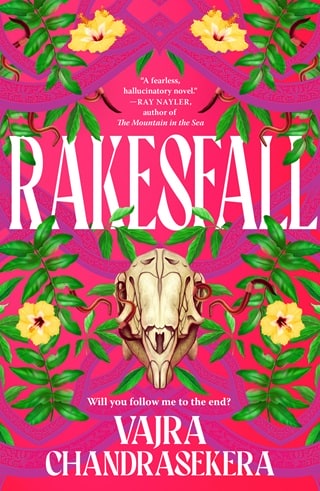Chapter 19 The Desolation
The scene of the crime: Earth, an old and haunted house.
The Lamb decides to take a look at the sites of the alleged murders. The Clave provides a decrepit dropship, piloting it themself—this time a purely virtual presence, bringing no birds along. The absence of the birds makes the Clave feel more remote, as if they're phoning it in. The dropship is a big egg the colour of dirt, about twenty metres long, with stubby wings and vectorable nozzles. There is no cockpit or visible instrumentation since it was designed to be piloted by someone like the Clave. Its innards are mostly empty space with a metal floor and metal benches to sit on. The Lamb is preoccupied with trying to sit on the bench, which is too low for her unfamiliar legs. It makes her back ache. The dropship wobbles a little as it rises above the valley, climbing slowly into the upper atmosphere. The light changes as they rise, growing warmer. The Lamb leans forward to catch sun in her face, eyes lidded.
Parts of the fuselage seem to be missing, or perhaps it was designed that way, but what's left of the airframe looks worryingly rusty. The craft doesn't seem very stable in the air, even as it picks up speed. She looks down at the valley, out of the gaps in the fuselage. The ghostly image of apocalyptic ash is intense from this angle, more real than the blue of the river or the green of the jungle, both of which seem fake and unconvincing, their colours too vivid. Perhaps this is the angle at which the satellites see the valley, so she's getting a heavier dose of their perspective. Or perhaps the signal is stronger the higher they climb. The dropship rattles alarmingly under her feet.
"Do you have anything that's not a wreck?" the Lamb says.
"Vintage," the Clave Eight says. They sound defensive. The backchannel attempts to show a gallery of search-and-rescue personnel carriers and dropships from various historical periods, in various states of dis/repair, but the Lamb blocks it. Apparently the caretaker collects them. She's about to complain that it will take forever to get anywhere in this bucket, but then the ramjets kick in and the buffeting of the wind through the holes ceases. There is a sudden oily smell, as if the entire aircraft had been bubbled in slick lubricant. She looks back through one of the holes in the fuselage and sees a hypersonic puff far behind them. The Clave sounds slightly distracted when they speak again. "Temporarily upgraded."
Despite this, it takes more than three kilosecs to get to the other side of the planet, which time the Lamb passes in boredom, clicking the metal bench with her nailless fingers. The Clave provides only the barest debrief. Relative to pre-diaspora history, the Earth is essentially uninhabited by humans, except for the maintenance team. "That limits the suspect pool, at least," the Lamb says uncertainly. She doesn't want to do any of this, but she doesn't want to go back to sleep either. Especially not after finding out about the murders: all four victims have been sleeping Contingencies. Better to stay awake.
"Questioning the maintenance team may occur after examining the murder sites," the Clave allows.
The Clave's drones provide high-fidelity recordings of all four murder sites; she has already played them back too many times. Each murder took place within the victims' Contingency Bunkers. Their locations are scattered across the continents, with no apparent clustering. None of the Contingencies awoke, as far as the Clave is aware.
"Why did it take four deaths before you decided it needed investigation?" the Lamb asks.
"Two happened in other polities," the Clave says. "Information was not shared. First time we encountered one in our territory we thought unfortunate accident. After second time we requested public consultation and data-sharing. Then: pattern."
"Is this one of the other polities we're visiting now?" the Lamb asks. She hasn't forgotten that the Clave had sought her out for international diplomacy.
"No," the Clave says. The backchannel provides a world map with historical annotations; there are fourteen nations, or really eight mega-polities, if she zooms out and counts long-established alliances and conglomerations as units. Their territories are non-contiguous, a colourful patchwork. The Clave is the third largest by territory, with tens of thousands of viridian patches all over the globe, which the Lamb spins on a finger, watching the colours bleed. The largest two polities are the others that have experienced murders. That makes sense, she supposes, if Contingency Bunkers are dispersed more or less evenly across the world—she asks this question.
"Of course not," the Clave says. The backchannel attempts to present a potted political history of the last three to four hundred gigasecs, and the Lamb waves it off.
"I'll read that if it becomes relevant," the Lamb says. She hopes it doesn't.
"Political history is always relevant," the Clave says. They sound like they're frowning.
"Context is important," the Lamb agrees politely. She just doesn't want to be swamped by information. She's slept too long and through too much history, even on this depopulated Earth, for her to possibly catch up over the course of this investigation. She can ask the backchannel for context, but then she's relying on the Clave's curation of historical salience. She suspects she would disagree. She attempts to glean a quick summary of current affairs: it seems all the polities of Earth are administered and governed by their sole citizens, caretaker systems like the Clave Eight, though of entirely different lineages of software and design philosophy. She politely refuses to dig deeper into this, despite the backchannel's urging. The maintenance team, who are themselves stateless, have contracts with some polities, but not others; therefore some parts of Earth are in much better repair. Most, but not all, polities were left behind by departing civilizations of the diaspora; some arose independently in the desolation.
"What is the desolation?" the Lamb asks. She heard that before, somewhere in the constant flow of information. The word fits her recurring hallucination of the world covered in ash and dross, but only she knows about that. It's hard to reconcile it with the green and flowering earth, even if that green is patchier than she'd first thought.
"Our term for our time," the Clave says. "What we caretakers call our loneliness. Our missions in the last three hundred gigasecs…"
The Lamb does not pursue this, because part of her is still struggling with her own sense of mission, what was taken away from her, the unwanted work she's been given instead. She doesn't want to hear about the emotional struggles of the caretakers. Instead, she turns to the backchannel and tugs carefully on the single thread of history that is the diaspora, the human diaspora from Earth into the galaxy, which had just been beginning when she went into her Bunker. She is curious about whether humans ever met any other life out there, but the answer appears to be no: there are no aliens, no resident strangers, at least in this universe. Humanity is still reaching out into the galaxy, taking various parts of the Earth ecosphere with them to replant, reseed, reconstruct, parody; some are remaking worlds and habitats to suit themselves, others remaking themselves to suit new worlds and environments, becoming the aliens, becoming strange.
There is more Earth life in the rest of the galaxy than on Earth itself. There are whales and butterflies aplenty out there, the Lamb learns, but none remaining on Earth. So perhaps the regreening is still far from complete, despite the trees and birds and green. Perhaps after she closes this case there will be good work for her, too.
The sensation of oiliness fades away. The dropship comes to a dead stop. The wind begins to buffet her again through the holes in the fuselage. They have arrived.
Descent is eerie. They drop vertically, like a controlled fall, slowly enough that she ought not to feel queasy, but somehow she still does. The vision of a dead Earth below is stronger than ever. They are falling into a bed of compacted ash, her satellites whisper urgently to her, and must pull up before they crash. She sees an endless expanse of dirty grey, wet from rains. It is without geological feature in any direction, no trees or plants, nothing but a monotone grey plain. Her eyes look for patterns, something to latch on to; she follows the striations in the ash, compacted and grooved by wind and weather, perhaps, though it looks as if it has been raked haphazardly. It reminds her of cooled lava, only less liquid, less rounded. Panic builds in her as the dropship approaches that surface at speed, a hammering feeling throughout her body, and she rises to her feet, gripping the airframe to brace for impact, but then they keep dropping and the ash is gone again. Below is the real earth. She drinks it in hungrily: a grassy plain, with forest in the distance.
She sees their destination, the Contingency Bunker. The location of the first murder that the Clave became aware of and the third overall. It doesn't look anything like hers. The Lamb saw it in the recordings, but its design is more offensive in person. It looks like a very small city, or a very large palace. It has no buildings as such, but is crowded with spiral-fluted towers—she thinks pillars, at first, but they are not holding anything up except the sky, which is vast and grey and cold.
Once the Clave lands the dropship, the Lamb steps out and walks toward the Bunker. The grass is wet under her feet. She is joined by a cluster of local birds, this time not laughingthrushes but blue magpies; six out of seven are the Clave. The six birds lead her into the Bunker, a colourful entourage with their bright blue bodies and bright red heads; the seventh bird is confused and follows behind.
The towers of the Bunker are very tall, now that she's on the ground. At the Bunker's diffuse outer edges they are narrow and clustered close together, and she has to turn sideways to pass between them. The deeper she gets, though, the towers become individually thicker and collectively more spaced out, and the going is easier. The floor is a little spongy, like a sheet of rubber, perhaps, melted and sticky from long eons in the sun. She pulls her feet away from the cling with distaste. The birds are flitting ahead, almost lost in the forest of pillars; she follows flashes of blue and red. The pillars cast heavy shadows and a permanent bitter wind blows through them. Sometimes, especially when the Lamb loses sight of the birds, her sensorium stutters and mountainous waves of ash flood between the towers, filling them up, filling her eyes and mouth with grit and sourness. The ash gets into her breathing-vents and clogs them and she has to wipe them clean, steadying herself on a nearby tower, until her senses stabilize. The tower material is colder than she expected.
The records indicated that this Bunker was not in fact even called a Bunker, but its name is untranslatable because the original language of its creators is lost—the backchannel contained a massive archive of philological speculation. The Contingency kept here was octopedal and equine at the same time, according to very old videos with so many frames missing that the image stuttered and jumped when the Lamb rewatched them on the flight. Or rather, the Contingency had been those things, because they are now a pale slush, seeping out of a great crack in one of the tallest and most central towers. The crack is several times taller than the Lamb. The blue magpies scatter about the damaged tower, not approaching it too closely. She approaches cautiously, not stepping in the egg-white gunk. It has cooled and hardened somewhat, and a stray leaf has fallen from somewhere—there are no trees nearby, the Bunker being some distance from the tree line—and become partially embedded. When the cold stiff breeze whistles between the towers, the leaf still moves a little, a tiny sail adrift, becalmed.
The Clave analysed the slush in their previous investigations—they flag the report they previously forwarded, as if the Lamb had not read it already—and identified it as the liquefied remains of the lost Contingency, created when their own contingent body and their Bunker's stasis protocols and healing protocols were tricked somehow, persuaded to turn upon themselves. The Contingency dissolved in their long sleep, drifted away in a dream. The Bunker's records indicate no awareness or distress; the fluxions of the Contingency's dreaming mind show no spikes of alarm, merely a slow gradient into inactivity. It should be a relief that this was not the work of a sadist, but the Lamb does not feel relieved.
It was definitely not an accident. The compromised systems bear the clear marks of intrusion, but not enough invasive code to analyse for a fingerprint. If it had been possible to solve these crimes through forensic analysis alone, the Clave would not have woken her. The Lamb scans the code anyway, at a level of abstraction high enough to compensate for her technical obsolescence. It's quickly obvious that the attacker found their crime easy. This Bunker, like all the Bunkers, is ancient. Its systems have been patched by a succession of caretaker systems, including multiple times by the Clave Eight, but it could not be fully upgraded without waking the Contingency, and so there are complex vulnerabilities that the Lamb's technical knowledge is too outdated to understand. She bumps up the Clave's explanation another few levels of abstraction, until the entire Bunker appears as an oyster with a pearl inside, and the attack as a knife.
"No, that's too simplified," the Lamb gripes.
"Accurate, however," the Clave says. "Knife is a problem from far outside oyster's context. Design has no defenses."
The Lamb sighs and dismisses the code. The ghost of fimbulwinter's ashes flickers in her sensorium, a faint distortion at the edges. For a moment it had seemed to her that the oyster lay on a deep bed of ash, slowly sinking. The muscles on the sides of her neck ache. "What caused the crack?" she asks, switching tack to examine the physical evidence. She approaches as close to the violated tower as she can without stepping in the body. The edges of the crack are not smooth as they would be if created by bots. There is some debris, too: small crumbled pieces of tower-material, which looks like stone to the Lamb but the Clave insists is a kind of plastic. Most of the debris has fallen inward. "It looks like someone swung a very big axe at it."
"Uncertain," the Clave says. "Possible." The backchannel attempts to speculate on weapons and technology that could have accomplished it, measuring angles, degrees of hardness and force, but the results are inconclusive. It could very well have been a giant axe. It doesn't really matter, the Lamb decides. Anybody in the maintenance team would have the access required to create any weapon and manipulate any forces that they needed, not to mention falsifying the records. The weapon is a dead end. Her knowledge of forensics is obsolete: another dead end, even with the Clave's help. The suspects are too empowered, and the technologies available to them in this strange future are too advanced. Questioning them is the only meaningful avenue of investigation. It's only a kind of nostalgia that compels the Lamb to see the bodies first.
On the flights between crime scenes, the Lamb looks down at the Earth and begins to understand how much of what she sees is artifice. They are flying low over a forest that seems false to her in some way, though there is nothing she can point to: the leaves and the trees do not seem either too perfect or too crude. Specklings of yellow leaves leave streaks in her vision that make her momentarily dizzy. "This forest doesn't exist," she says at last. She hesitated over it, wondering if it was another hallucination of her errant sensorium, but the backchannel seemed to verify her impression.
"Yes," the Clave says. They take a long moment to respond, as if not sure whether this was a statement that required acknowledgement.
"Why?" the Lamb demands. The dropship is low enough to almost brush the treetops that do not exist.
"Aspirational illusion," the Clave says. "Also placeholder marker for the maintainers." They pass her a key.
The Lamb turns the key; the forest pops out of existence. The absence of the illusion abruptly changes the quality of the light, as if a cool containing bubble had popped and let in hot angry light from outside. The landscape below is a ruin, and full of ruins, though nothing that rises into the sky. Rather, it is the ruin of what must have once been a below-ground habitat, a great complex of tunnels and underground spaces, perhaps a kind of bunker. The layers of earth and rock and metal that must once have shielded it from the surface have been abraded, laying the underground complex open to the sky. Loose dirt is piled in what might once have been great hallways or meeting rooms or storage closets or sleeping chambers or communal baths. Low piles of trash dot this unburied world, mounds of the unbiodegradable. The Lamb looks for bones in the dirt and the garbage and sees none, though they must surely exist. They are moving fast enough that it's hard even for her augmented eyes to pick out such fine details.
The next crime scene, the second in territory controlled by the Clave, chronologically the fourth and most recent so far, is eerily familiar even though it is on a different continent. After they leave the ruined underground behind; after they pass a lagoon full of great soft lungs the size of whales, breathing hard and in pain; after they cross a brief purple sea that seems to host no marine life whatsoever, a barren salty waste haunted by the ghosts of whales and dolphins, who gambol in the waves if the Lamb toggles the aspirational illusions back into place, they reach a valley much like her own, and a Bunker much like her own. The air is drier and warmer here—she can feel it in the roughness of her lips when she runs her tongue over them—but otherwise the similarity is uncanny. The Lamb is cautious of triggering a hallucination of ash, but her sensorium remains stable, fimbulwinter only a grey whisper at the edges. Perhaps the undoing of aspirations has helped.
The scene is analogous to the previous: the door to the Bunker has been shattered open in a way that suggests a heavy edged weapon, and the Contingency within reduced to a slurry, this time reddish brown. Records show this Contingency wearing a vaguely similar design to the Lamb, their engineers belonging to an offshoot of the same polity some gigasecs later. In the archive footage this Contingency is enough like a mirror to be disturbing, especially when the Lamb flips back to the real to see the sludge at her feet.
"How many Contingencies remain on Earth, that you know of?" the Lamb asks, staring at the slurry. The Clave presents a number much lower than she'd expected; all are sleeping, except for the Lamb. A quick historical backscroll shows the number of available Contingencies gradually reducing over the eons. "Is it possible that some of them were intentionally made inactive? Sabotage preceding this string of more obvious murders?"
"Possible, but no evidence thereto," the Clave says. "No suggestion thereof."
The backchannel lists an array of natural disasters and systemic failures. Some Bunkers were destroyed in earthquakes; some drowned by rising seas; many lost power or structural integrity over time, until finally collapsing. None of them show obvious signs of foul play. The failures do cluster in time sometimes, but in easily explicable ways, such as increased seismic activity in a given area, or the legacy of particular historical contractors whose substandard designs led to predictable patterns of failure in deep time. But the Lamb is suspicious of everything. She needs air; her vents feel clogged. She goes outside and runs a diagnostic absentmindedly, staring out over the valley. She tastes ash, then tells herself firmly that she does not. There is not much green here, except for the bright scum on the surface of a small lake at the far end of the valley. It draws the eye; she turns away.
"Is it possible for me to see the other two sites?" she asks. "Is there a diplomatic process?"
The Clave's drone bird comes back out of the Bunker and sits on her shoulder, a familiarity which the Lamb dislikes. The bird flicks each wing once, as if brushing itself off. "Somewhat," the Clave says. In this valley, the Clave's representative bird is a solitary cuckooshrike, grey upon grey like ashes. The bird vibrates when they speak. "We have already begun negotiations with both other polities."
"When you say we," the Lamb says, turning her head slightly to look at the cuckooshrike. "You mean you and me? Or yourself?"
"Both." The bird cocks their head: the Lamb dips into the backchannel to learn that a cuckooshrike is neither a kind of cuckoo nor a kind of shrike. "The Clave series were designed as representative democracies. We are a gestalt of thousands of subsystems."
"But you've been a stable gestalt for longer than some pre-diaspora polities," the Lamb points out. "You're not really a collective, as I understand it. Your gestalt is itself personhood. You could say I, if you wanted to."
"Sometimes we disagree," the Clave says.
The Lamb laughs. "That's personhood, all right."
The Clave makes a noise that the Lamb can't parse. "I will take that under advisement," they say. "We should do an interview next; one of the maintainers is not too far from here."
 Fullepub
Fullepub 



